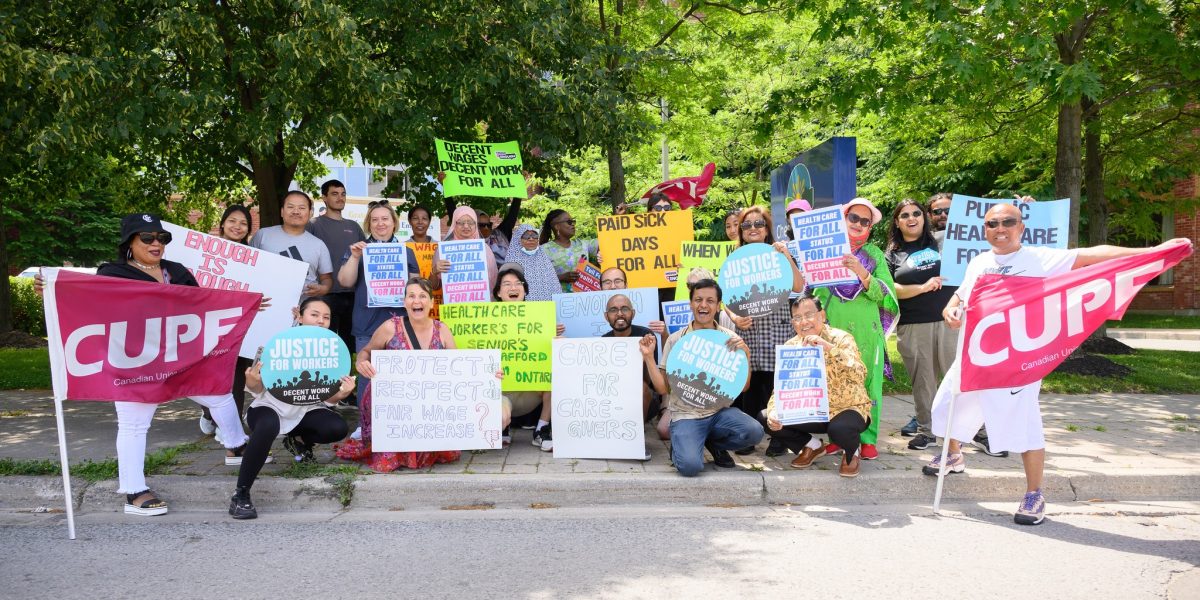On Saturday, July 8, dozens of workers and their supporters attended a barbecue hosted by members of CUPE 3224 at Chester Village Long-Term Care Home in Scarborough, Ontario. The barbecue was a chance for the community to show their solidarity with the workers, who are in collective bargaining with their employer fighting for better wages, better health benefits, and paid sick days.
It was a beautiful, sunny day, with workers and supporters eating together, chanting together, and waving signs, cheering every time a passing motorist honked their horn in support. Despite the challenges long-term care workers are facing at work and in bargaining, the barbecue was a way to make our solidarity visible and prepare for the fight ahead.
One percent raise in last five years
The workers at Chester Village have been without a contract since 2021. Their previous contract was negotiated in 2018 under the public sector wage-capping Bill 124, meaning that in the last five years, their wages have gone up by just one percent. This, despite all the challenges these workers have experienced and overcome since 2018—the pandemic they worked through to keep residents safe, the slashing of jobs and workplace budgets, and the rising cost of living to name a few.
One worker reported that in the last five years, her hourly wage has gone up by just twenty-two cents. Now that Bill 124 has been overturned, the union is seeking a wage that is commensurate with the work that they do (and have been doing for years).
Under the current arrangement, even the benefits that workers do have are not equally available. While full-time staff have health benefits and paid sick days, part-time staff do not, even though they do the same work and face the same health risks and contagions working in long-term care. Just as workers stood shoulder-to-shoulder at the July 8 action, the workers are fighting for equal benefits for everyone at their workplace. The gathering was a show of solidarity that reflected how they are standing with one another throughout this collective bargaining process.
Management, however, has responded by refusing to negotiate. Workers report that when the union submitted their proposal at the first bargaining session, management stood up and left—no counteroffer, no negotiating, nothing but an empty table. At the most recent bargaining session, management tabled an offer that did not respond to any of the demands workers are making and once again left without negotiating.
A banner hangs outside the facility declaring that Chester Village is “Grateful, Thankful and Proud of our Essential Employees.” But this refusal to bargain sends the opposite message.
Working conditions are living conditions in long-term care
After everything long-term care workers did to keep us and our loved ones safe during the pandemic, it seems employers still do not care that workers are feeling the squeeze from the most recent rise in the cost of living.
“We are overworked, we are undervalued, we are underpaid. We are short of staff. Nobody wants to come and work for almost nothing. The rents are going up, the grocery bills are going up, but our wages are stuck,” said Katica, a Personal Support Worker at Chester Village.
The workers are not the only ones affected by management’s decisions.
In long-term care, working conditions are the residents’ living conditions. At the height of the pandemic, Dr. Theresa Tam, Canada’s chief public health officer, noted that the best way to stop outbreaks at long-term care facilities is for homes to increase staffing levels and offer better jobs with health benefits, including paid sick days. When workers are better supported, they are better able to take care of our loved ones.
Family members of residents joined the barbecue to offer their support, with homemade signs no less.
“They work hard. They should be paid for the job they do. Not many people would like to do that job,” said one supporter whose wife lives at Chester Village.
“We all stand together”
At the barbecue, the workers showed that they are not afraid to fight back.
“We are here to tell the employer that we all stand together,” Katica said. “Being here makes my heart full with hope, that there is hope for us, there is hope for healthcare workers, there is hope for all of healthcare.”
With workers, family of residents, and community supporters all fighting together, hope can generate a better situation for everyone at Chester Village—but only if management returns to the table and listens to the people who take care of us.
Did you like this article? Help us produce more like it by donating $1, $2, or $5. Donate

